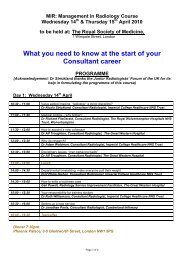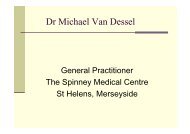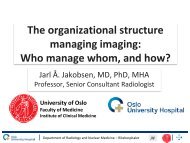Phil Shorvon FRCP, FRCR,FBIR Chairman of ... - MIR-Online
Phil Shorvon FRCP, FRCR,FBIR Chairman of ... - MIR-Online
Phil Shorvon FRCP, FRCR,FBIR Chairman of ... - MIR-Online
Create successful ePaper yourself
Turn your PDF publications into a flip-book with our unique Google optimized e-Paper software.
<strong>Phil</strong> <strong>Shorvon</strong> <strong>FRCP</strong>, <strong>FRCR</strong>,<strong>FBIR</strong><br />
<strong>Chairman</strong> <strong>of</strong> Association <strong>of</strong> Independent Radiologists
Do’s
Dont’s
Types <strong>of</strong> independent practice for<br />
radiologists<br />
• Private patients in NHS trust<br />
• Locum work<br />
• Sessional work in private facility<br />
• Individual case work in private facility<br />
• Group practice direct referral<br />
• Stand alone units<br />
• Teleradiology<br />
• Medico legal work
Getting Started
Should I do private practice?<br />
Pro’s:<br />
• Financial‐ slice <strong>of</strong> UK private<br />
healthcare market <strong>of</strong> £4bn with 7.5<br />
million insured patients (13%<br />
population)<br />
• Satisfaction‐ different ethos<br />
• Independence<br />
Cons<br />
• Hassle<br />
• Commitment<br />
• Insecurity<br />
• Indemnity<br />
• Time<br />
• Providing year round service
Getting Started<br />
• Most do private work in NHS facility<br />
• Look at locums at private facilities<br />
• Consider teleradiological work<br />
• Let clinicians you work with know where you can do<br />
private patients/ clinicians will try to help you<br />
• Ensure you have ‘admitting rights’ where you do<br />
private work
Its important to keep to the rules
Legal framework<br />
• Sole practice<br />
• Chambers: group working from same <strong>of</strong>fice/sharing<br />
<strong>of</strong>fice expenditure but independent practitioners. No<br />
fee sharing. No liability for other members<br />
• Partnership –liability for other partners, share pr<strong>of</strong>it<br />
and loss<br />
• Limited liability partnership‐ publish financial<br />
statements/more flexibility/protection from other<br />
parties negligence<br />
• Limited Company‐ No personal liability for company<br />
debts
WHAT SHOULD (or shouldn’t) I<br />
DO?<br />
• Basic rule: don’t undertake anything I don’t do in my<br />
NHS practice<br />
• Ensure you feel fully trained in what you do<br />
• Get on with your colleagues<br />
• Don’t issue a report you are unsure <strong>of</strong><br />
• Don’t ‘steal’ cases<br />
• Meet GMC guidance on practice.<br />
• Always act in the patients interest<br />
• Ensure your private work is included in your job plan
Must haves to do private practice<br />
• Medical degree<br />
• Certificate <strong>of</strong> completion <strong>of</strong> training<br />
• Entry in GMC specialist register<br />
• Pr<strong>of</strong>essional indemnity
Indemnity fees‐example<br />
Earnings Fees % income (midpoint approx)<br />
• 1‐7.5K £ 575 10<br />
• 7.5 ‐15K 1845 15<br />
• 15‐25 K 2715 13.5<br />
• 25‐35 K 3305 11<br />
• 35‐50K 3850 9<br />
• 50‐75 4580 7.5<br />
• 75‐100 5435 6.5<br />
• 100‐125 6005 5<br />
• 125‐175 7120 5<br />
And remember ‐ The tax man takes 40% soon to be 50+%<br />
‐ Accountants fees<br />
‐ Expenses
Practicing Privileges for private<br />
hospital<br />
• Meet standards <strong>of</strong> local MAC<br />
• Meet clinical governance requirements (CRB check,<br />
appraisal up to date, indemnity insurance, GMC<br />
registration etc)<br />
• Hospitals can refuse – no ‘right’ just because meet<br />
standards
Benefits versus your Fees<br />
• Most radiologists do not collect fees but are paid by<br />
the private facility<br />
• If separate fees are charged then:<br />
• Benefits are what insurance companies will pay/fees<br />
are what you charge<br />
• Avoid ‘agreeing fees’ with others (anticompetitive)<br />
unless part <strong>of</strong> legal partnership<br />
• Patients should know in advance if fees will be more<br />
than benefit.
BILLING‐SEPARATE BILLING<br />
• ACCURATE RECORDS ESSENTIAL‐INSURERS<br />
OBSESSED WITH FRAUD AT MOMENT‐ and so is<br />
the inland revenue.<br />
• Keep record full details <strong>of</strong> patient/their insurance and<br />
authorisation/the procedure/ complications etc<br />
• Electronic records require Data Protection Act<br />
registration
ADVERTISING
ADVERTISING<br />
• The GMC is now in favour <strong>of</strong> doctors providing<br />
accurate information about services to patients as<br />
long as both their own guidance, and that <strong>of</strong> the<br />
Advertising Standards Authority (ASA), is heeded.<br />
• The ASAs Codes require that all advertisements<br />
ARE legal, decent, honest and truthful and prepared<br />
with a sense <strong>of</strong> responsibility to customers and<br />
society.<br />
• All advertisements respect the principles <strong>of</strong> fair<br />
competition, and should not bring advertising into<br />
disrepute.
Advertising‐ do’s<br />
• Key facts about the practice<br />
• Names and qualifications <strong>of</strong> the doctors and other<br />
healthcare pr<strong>of</strong>essionals.<br />
• Biographical details and any special interests<br />
• Contact details,<br />
• Opening times and any other factual patients may<br />
need to know.<br />
• No restriction on media eg websites, newspapers or<br />
magazines , leaflets
ADVERTISING‐DON’TS<br />
Unjustifiable claims<br />
Putting fear into public<br />
Phone marketing<br />
No ‘cure’ claims<br />
No taking advantage <strong>of</strong><br />
lack <strong>of</strong> medical<br />
knowledge<br />
No undermining<br />
colleagues<br />
No unfounded criticism
Don’t make unsubstantiated claims
GMC guidance<br />
• Good clinical care –doctors must provide good<br />
standards <strong>of</strong> clinical care, must practise within<br />
the limits <strong>of</strong> their competence, and must ensure<br />
that patients are not put at unnecessary risk.
GMC<br />
• Maintaining good medical practice –doctors<br />
must keep up to date with developments in their<br />
field, maintain their skills and audit their<br />
performance<br />
• Relationships with patients– doctors must<br />
develop and maintain successful relationships<br />
with their patients, by respecting patients’<br />
autonomy and other rights.<br />
• Working with colleagues –doctors must work<br />
effectively with their colleagues.
.<br />
GMC<br />
• Probity –doctors must be honest and<br />
trustworthy.<br />
• Health –doctors must not allow their own health<br />
condition to endanger patients.
GMC ‐conflicts <strong>of</strong> interest<br />
You must act in your patients’ best interests when making referrals<br />
and when providing or arranging treatment or care. You must not ask<br />
for or accept any inducement, gift or hospitality which may affect or<br />
be seen to affect the way you prescribe for, treat or refer patients. You<br />
must not <strong>of</strong>fer such inducements to colleagues.<br />
If you have financial or commercial interests in organisations<br />
providing healthcare or in pharmaceutical or other biomedical<br />
companies, these interests must not affect the way you prescribe for,<br />
treat or refer patients.<br />
If you have a financial or commercial interest in an organisation to<br />
which you plan to refer a patient for treatment or investigation, you<br />
must tell the patient about your interest. When treating NHS patients<br />
you must also tell the healthcare purchaser.
A Charter for Patients and their<br />
Doctors‐ FIPO<br />
• The patient's best interests are always the primary concern<br />
<strong>of</strong> all doctors, whether practising in the National Health<br />
Service or Independent Sector.<br />
• However, the immediacy <strong>of</strong> payment and the varying types<br />
<strong>of</strong> reimbursements and funding arrangements in the<br />
Independent Sector have the potential to create additional<br />
ethical difficulties. All registered medical practitioners<br />
must adhere to the guidance issued by the General<br />
Medical Council in<br />
http://www.fipo.org.uk/pdfs/FIPO_Patient_Charter.pdf
Current threats<br />
• Networks‐ industry view ‐ensuring<br />
quality/low prices<br />
‐Doctors view‐restrictive<br />
practice<br />
• Delisting <strong>of</strong> consultants‐insurance companies can do<br />
this unilaterally<br />
• Unilateral fee setting by providers‐no consultant<br />
direct billing<br />
• Insurers setting themselves as setting standards<br />
• Teleradiology
Effect?<br />
• Gross fees for ‘avarage’radiologist down by 3% 2007 to<br />
2008<br />
• Costs dropped by 7%<br />
• Taxable pr<strong>of</strong>its down by 1.5%<br />
• More ‘intervention’ (? Image guided injections??)<br />
proteting income to some degree<br />
• Bad debt reducing<br />
• Expected pressure on fees will increase
Response?<br />
• Do keep within the law<br />
• Avoid any restrictive or<br />
anti competitive<br />
behaviour<br />
• Emphasis on patient<br />
interests/quality and<br />
compliance with good<br />
practice and statutory<br />
regulations
What shouldn’t I do ?<br />
BASIC RULE<br />
If it feels wrong‐it probably is
SO IS IT ALL WORTH IT ?<br />
• Satisfying –private facilities ensure you work<br />
efficiently‐ you are their source <strong>of</strong> income<br />
• Satisfying‐ the patient ‘choses’ you as an expert<br />
• Rewarding‐ but it takes a lot <strong>of</strong> hard work<br />
• Direct relationship between your effort and what you<br />
get from it














